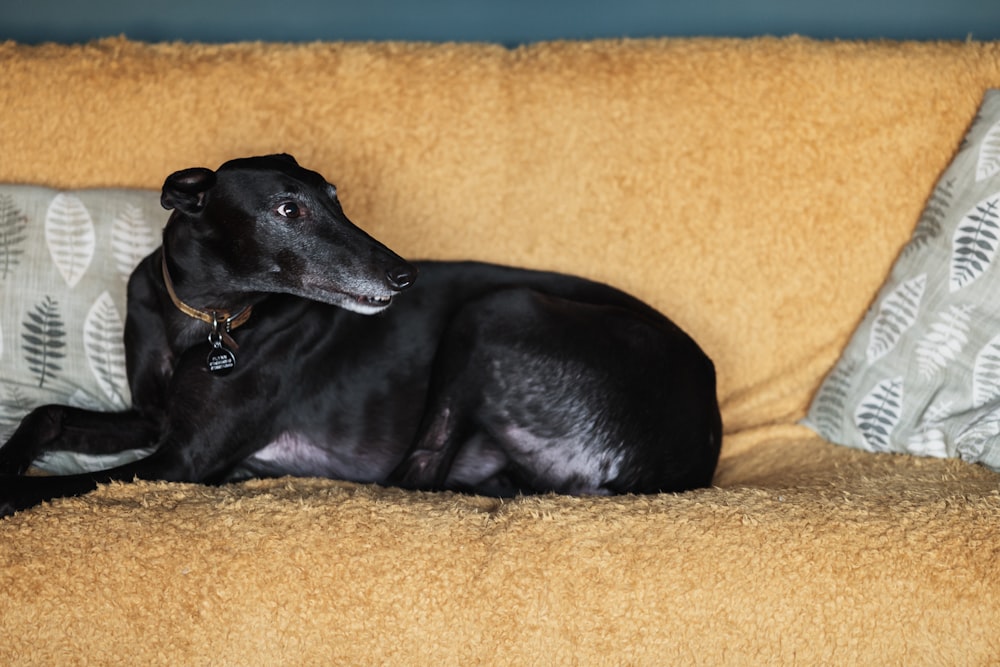It’s been a long day at work, and you’ve counted the hours until you can go home and relax. It seems, however, that your canine companion had plans of their own as your desire to wind down on the couch turns into hours of cleaning up stuffing ripped out by your loving dog!
The reason your dog is digging on the couch is linked to a natural hunting instinct to find anything that they can hear and smell. Digging is an instinctive canine behavior widespread in many dog breeds. Some dogs dig for fun to alleviate boredom, while others may have a powerful genetic predisposition to dig.
In this article, we’ll explore the many reasons dogs dig in couches and other furniture and consider what we can do to stop or redirect this destructive and sometimes costly behavior.
Why Do Dogs Dig on Couches and Furniture?
While you may not quite understand what your dog is doing, these spur of the moment digging episodes can actually have various explanations.
Searching for Crumbs
Dogs have a powerful sense of smell, and your canine can smell any food spilled on the couch and will eagerly attempt to seek it out. This behavior is normal as your dog will want to retrieve every last bit!
There may even be an intriguing odor that a visitor has left behind, compelling your dog to dig around to find out what it is.
To Get Comfortable
There was a time when dogs lived in the wild and had to make themselves comfortable by rearranging their environment. They did this by digging, turning in circles, and creating a safe space on which to rest.
To Bury Items
Your dog may try to hide and protect their beloved bones or toys by hiding them on your couch. This is their attempt to safeguard their valuable items instinctively. This is done by digging in your couch so that when you decide to sit down to watch TV, you are more than likely going to discover an array of treasures.
To Combat Boredom
When dogs are bored, they tend to become destructive, especially working breeds. This boredom can easily cause them to dig in your couch or even scratch your carpets or bedding.
If you feel your dog is not being stimulated enough, it may be time to engage them in some more activity and teach them some alternative behaviors.
To Deal With Anxiety
Dogs can display several destructive behaviors when they are left alone to their own devices. This behavior can be due to anxiety and can cause them to urinate, defecate, howl, chew, dig, and even try to escape.
While such problems often indicate that you should teach a dog polite house manners, they can also be symptoms of distress (source).
Separation Anxiety
When a dog is stressed, it will exhibit drooling and anxious behavior. This behavior can especially happen when you are getting ready to leave the house. This doesn’t mean your dog is disobedient; it is simply a sign that they may be suffering from separation anxiety.
Separation anxiety is normally triggered when dogs become upset due to separation from their owners. This anxiety can, in turn, trigger couch digging and an array of other destructive behaviors. Some dogs may even attempt to escape from home.
Establishing why your dog is reacting badly when left at home can be quite difficult. Research has shown that half of the dogs suffering from separation-related behavior will not show any signs (source). In turn, this will no doubt leave you wondering why you have arrived home to a dug up couch.

Putting a Stop to Digging
Unfortunately, you cannot stop your dog from being a dog. Although you may not be able to stop the digging completely, there are ways to minimize the behavior. Start by trying to determine why your dog is digging. Once you have identified the cause, it will be easier to curb your dog’s behavior.
You can help your dog in many ways to overcome boredom and anxiety.
Firstly, it is important to ensure that your dog is receiving enough exercise and mental stimulation daily. Find ways to make the backyard seem more appealing to your dog by ensuring that there are puzzles or toys for your dog to play with.
It is important to facilitate training sessions in the garden for your dog. This can go a long way to occupying and exercising your dog, as well as teaching your dog that the backyard is fun, interactive, and interesting.
Every time that you reward your dog for its changed behavior with a new toy or treat, your dog will start to realize that their new actions are much more rewarding than their digging.
Still, it’s essential to remember that the backyard is not meant for solitary confinement, and you should refrain from leaving your dog alone outside for long periods.
If you catch your dog digging at any time, it is imperative to redirect its attention to some other activity, such as playing with a toy or playing fetch with them.
Channeling the Digging
No matter what you may try, your dog’s instinct to dig can still take over. Sometimes the phrase “If you can’t beat them, join them” will apply. If digging makes your dog happy, you should consider giving your dog a dedicated digging spot, such as a sandbox.
Use the sandbox to bury toys and bones so that your dog will be rewarded by digging there rather than in your couch or your garden. Any time your dog starts to dig somewhere other than the digging spot, gently redirect them and reward any digging that happens in that preferred place (source).

Final Thoughts
Dogs were not meant to be alone. Take the time to train patiently and pay attention to your dog. However, there will be times where your dog’s instincts will naturally take over, and it is usually a good idea to get a neighbor or a pet walker to look after your dog should you be gone for a long period.
If you find that these strategies are still not solving your dog’s digging problem, you may want to consult with a professional behaviorist to seek additional help.


0 Comments